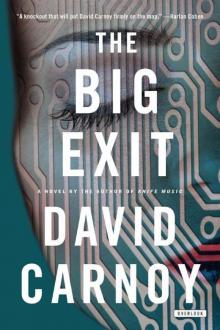- Home
- David Carnoy
Lucidity
Lucidity Read online
Dreams and deception collide in Lucidity, David Carnoy’s page-turning tale of murder and manipulation. After his “gripping, suspenseful, totally believable—and shockingly good” (Harlan Coben) debut Knife Music and chilling follow-up The Big Exit, Carnoy’s Detective Hank Madden returns in this bicoastal suspense novel that pits dreams against reality, where nothing can be taken at face value.
Twenty years after the unsolved case of Stacey Walker’s disappearance went cold, retired police detective Hank Madden is conscripted to find her body and track down her missing husband, her presumed murderer. Four months later, editor Max Fremmer’s client Candace Epstein is pushed in front of a car near Central Park. As he digs into her background to clear his name, Fremmer grows suspicious of Candace’s connection to a nefarious institute for lucid dreaming on the Upper West Side and its staff of crooked characters.
As similarities arise between the cases on each coast, Detective Madden and Fremmer forge an unlikely partnership to expose what misconduct lurks beneath the façade of the Lucidity Center and unravel the secret that links their investigations. Lucidity stuns with complex detail that will keep readers guessing until the final, satisfying jolt.
BY THE SAME AUTHOR
Knife Music
The Big Exit
Copyright
This edition first published in hardcover in the United States in 2017
The Overlook Press, Peter Mayer Publishers, Inc.
NEW YORK
141 Wooster Street
New York, NY 10012
www.overlookpress.com
For bulk and special sales, please contact [email protected],
or write us at the above address.
Copyright © 2017 by David Carnoy
All rights reserved. No part of this publication may be reproduced or transmitted in any form or by any means, electronic or mechanical, including photocopy, recording, or any information storage and retrieval system now known or to be invented, without permission in writing from the publisher, except by a reviewer who wishes to quote brief passages in connection with a review written for inclusion in a magazine, newspaper, or broadcast.
ISBN 978-1-4683-1526-4
Contents
By The Same Author
Copyright
Dedication
0/ Prologue
Part 1
1/ Readers Love Ballsy Women
2/ The Best Thing in the World
3/ iPhones for Guns
4/ Embrace the Hate
5/ Suspect in Custody
6/ Killing It, Frankly
7/ Mr. Plant
8/ She Doesn’t Come Cheap
9/ Best I Can Do
10/ A Strange Request
11/ First Mover
Part 2
12/ Lennon’s Least Favorite Beatles Song
13/ Getting Woozy
14/ Bang ‘n Bolt
15/ The Agitator
16/ Snake in a Jar
17/ A Guiding Hand
18/ Long Road of Dead Ends
19/ 5150
20/ Harmless
21/ Unconditional Release
22/ Crime Drop
23/ ICU
Part 3
23/ Kevin Spacey Calling
24/ A Gramme is Better Than a Damn
25/ Escape Clauses
26/ Money Not in the Bank
27/ Evidence Bag
28/ Contingency Plan
29/ Ask the Void
30/ Repercussions
31/ Dumb Luck
32/ The Oracle
33/ View To A Kill
34/ Fourteen Postcards
35/ Epilogue
36/ Acknowledgments
About the Author
For the fantastic four: Natalie, William, Andrew, and Catherine
0/ Prologue
THE FIRST CALL CAME IN AT 6:08 AM.
“Send an ambulance to Central Park West and 75th,” a male caller said in an eerily measured voice, as if arranging a ride to the airport. “Someone just got hit by a car. There’s a body in the middle of the street. I can see it from my window.”
“OK, sir,” the 911 dispatcher responded. “Let me make sure I heard you correctly. You said someone was hit by a car?”
“Yes.”
“How long ago did this happen?”
“Like fifteen seconds ago.”
“Did you see it happen?”
“No, I heard it. Get some paramedics here quick.”
The line went silent.
“An ambulance and the police are on the way,” the dispatcher said after a moment. “Can you tell me what you heard, sir?”
“I heard a screech of tires and a kind of thud. Now this woman is standing outside her car screaming. It’s a BMW 3-series.”
“You hear screaming now?”
“The woman who hit the person is screaming. I can see the whole thing. I’m on the third floor. Hold on, I’m going to take some pictures.”
Another short silence.
“Sir, are you still there?”
“Yeah. She’s totally freaking out. You’ve gotta have more calls coming in.”
They did. Another dispatcher was speaking to a woman who lived on the eighth floor of the same apartment building. And a third caller, who identified himself as a doorman, sounded distressed.
“It looks bad, man,” he said. “Tell them to hurry.”
The first calls came mostly from the north tower of the fabled San Remo, a hulking twin-steepled architectural gem that dominated the western skyline over Central Park. The San Remo was one among many grand pre-war co-ops along Central Park West, the West Side’s so-called “gold coast.” But it was also grander than most. It even had its own Wikipedia page that included a list of celebrities—past and present—that owned apartments there.
The only eyewitness to the accident, a runner on her way into the park, reached a 911 operator a full five minutes after the first caller. A little breathlessly she explained that she’d just seen a woman get pushed in front of a car.
“I’m sorry I didn’t call sooner but I didn’t have my phone with me. I had to borrow someone’s.”
“That’s OK,” the dispatcher said. “Have you spoken to any police officers yet?”
“No, they’re trying to keep everyone away from her. The ambulance just got here. The paramedics are working on her. There’s a lot of blood. My God, I hope she isn’t dead.”
“OK, I need you to stay there and give a statement to a police officer. They need to know what you saw. But I also want you to tell me what you saw and I’ll make sure they get it.”
The NYPD had a smattering of high-resolution cameras in and around Central Park, but none near the intersections of 74th or 75th and Central Park West; the closest was a block south at 73rd. The San Remo, however, had its own security cameras and one of them did record the accident. The grainy video would support what the jogger told the dispatcher:
“This guy, he looked like a homeless guy, came up to her while she was in the crosswalk,” she said. “She was walking her dog. He was slightly behind her to her right. She looked over at him. I don’t know if she said anything or not. But suddenly he lunged forward and pushed her into the street just as a car was coming.”
The vehicle’s front bumper struck the woman just below the knees, taking her legs out from under her. She rolled up onto the hood, ricocheted off the edge of the windshield and corkscrewed gymnastically in the air. Her right hand hit the pavement, followed by her hip and torso, and then her head, face-first. One of her shoes came off and her cell phone skittered across the street, all the way to the other side, where it was found resting next to the back tire of a parked car, the screen cracked but otherwise operational.
“I went over to help,” the jogger
said, her voice wavering. “I didn’t know what to do. I’d never seen anything like that. There was so much blood. It was coming out of her ears.”
PART 1
1/ Readers Love Ballsy Women
“MY PROTAGONIST IS THE PROBLEM,” THE PROSPECT SAID.
“The rest is good.”
The rest wasn’t good, Fremmer thought. But at least it was bad in a good way. A campy way.
“She use the U word?” he asked the prospect.
“The U word?”
“Unsympathetic.”
The prospect’s eyes flashed a glint of pain. His name was Brian. Brian Tynan. Compliance officer by day, aspiring novelist by commute, he’d written a zombie techno thriller while riding on Metro North. Croton Falls to Grand Central and back. The first draft took a year. The rewrites another eight months, maybe longer.
“I made the changes she suggested,” Brian said, referring to his agent. “I made him more sympathetic. But she won’t send it out anymore. Look, the guy, the protagonist, is a tech entrepreneur. He’s a little bit of a douchebag. They all are. It’s part of their DNA.”
Fremmer nodded. They were seated near the front window of the Starbucks on Columbus Avenue and 81st Street. Fremmer had scootered there fifteen minutes earlier from his apartment a few blocks away. Brian was already at a table, waiting for him, not exactly what Fremmer expected. When a guy tells you he’s a compliance officer for a bank, you think little bald guy with spectacles. But Brian was tall. Maybe six-three, a little overweight, big head and features and wavy salt and pepper hair parted neatly to the left. In his late forties, he was wearing a standard-issue gray suit and blue striped tie. Physically, he was imposing. But as soon as he started talking he shrunk. Not timid exactly. Just unsure of himself, not comfortable in his skin. He had a tic, too. The right eye, it fluttered now and then.
“I’m more partial to penis,” Fremmer said. “Or prick. Douchebag is overused at this point. So much so that you sound like a douchebag for using it.”
“Oh, sorry,” Brian said.
“Don’t be sorry. The point is he’s not douchey enough.”
“Not enough?”
“Not even close.”
“But how would that make him more sympathetic?”
“It wouldn’t. But it would make him more likeable. You’re looking for likeable, Brian, not sympathetic.”
“Aren’t they the same—or at least similar?”
“You said your wife left you for your contractor.”
“He wasn’t my contractor. He was just a contractor. He has a masonry business. What’s that got to do with anything?”
Fremmer leaned forward, lowered his voice. “It’s a crappy situation. Wife leaves you. Custody battle. Now you get your kids every other weekend. Bummer. I feel bad for you. But then I hear you’ve got a little bit of a temper. You lose it from time to time. Go off. Some might call it an abusive streak.”
“I told you she only said that because she was trying to get full custody. Believe me, she was far more abusive than I ever was. She called me names. Demeaning names.”
“You’re the victim, Brian. I get that. But see how easily I’ve made you unlikeable. Just from the guilty look in your eyes right now I can totally understand why your wife left you for your contractor.”
“He wasn’t my contractor.”
“I know. The point is your agent who’s not really your agent because she only took you on because your older, more successful brother asked her to, isn’t going to give it to you straight because she doesn’t want to harsh on someone who’s in such a fragile state of mind.”
“Younger brother,” Brian said. “He’s my younger brother.”
“Whatever. Just understand that I don’t have a problem telling it like it is. I’m not going to toss off some dismissive comment about your protagonist not being sympathetic enough. He’s actually pathetic, if you want to know the truth. He’s completely overshadowed by the villain, the Evil Steve Jobs character.”
The antagonist had a real name, but skimming the book while sitting on the toilet that morning, Fremmer noticed a line about how the bad guy—the diabolical venture capitalist using the protagonist’s social-media start-up to turn everyone into zombies—reminded people of “an evil Steve Jobs.” The description stuck.
The prospect slumped in his chair. He was crestfallen. Mission accomplished. Teardown complete.
“So you don’t think I should publish it?” he asked.
“No, by all you means you should publish it.”
A woman at a nearby table glanced up from her laptop. Fremmer often raised his voice when uttering the “p” word in Starbucks. He likened it to a duck call—but for writers. These places were teeming with potential clients.
“I should?”
“Absolutely,” Fremmer said. “But not for the bullshit reason you gave me. Sure, in your present financial condition, it’d be nice to make some extra money. But we know the real dream is to show your ex-wife that you aren’t the putz she thinks you are. That instead of forever talking about writing that novel, you went ahead and did it.”
“So you think it’s publishable?”
“Anything’s publishable, Brian.”
“What I mean is, you think there’s enough here…you think it’s good?”
“With a little work, I can make people think it’s good. And I can also make you feel like you accomplished something.”
“How much will that cost? To do that?”
“About nine grand,” Fremmer replied without hesitation. “And that’s only if we do the e-book.”
Brian blanched. “That seems a little steep.”
“Very. So here’s what I’m going to do. Normally you’d have to pay a professional editor at least $3,000 to go through your book and give you a detailed critique. And that doesn’t include line editing or copyediting.”
“I thought that’s what you did. You’re a book doctor.”
“No, that’s just my Google title. For SEO. Think of me more as a book expediter, a shepherd if you will. I’ve spent years vetting the right cover designers, formatters, copy editors, and the people you’re going to pay to review your book, etcetera, etcetera.”
Brian laughed, but he clearly didn’t find the remark funny. In fact, he was offended. “So you have people create fake reviews for my book? That’s what I’m hiring you to do?”
“First of all, I don’t work for you, you work for me. You’re hiring me to work for me. Secondly, they’re not fake reviews. They’re real reviews written by fake people. That’s different from fake reviews written by real people. Those are the ones you get from friends and relatives. You’ll need some of those, too.”
Another laugh, this one more incredulous than the last. “You’re a piece of work, Fremmer. The scooter, the T-shirt, all part of the act, right?”
“Max,” Fremmer said, not taking offense. “Call me Max.”
Fremmer leaned down to fish out a small pad of paper from a backpack sitting on the floor next to a folded-up Xootr kick scooter. Judging from his attire, that scooter could easily have been mistaken for a fashion accessory—or, as Brian had put it, “part of the act”—for Fremmer looked like an over-the-hill skateboarder or former Internet executive who’d gotten his big exit and decided to check out of the rat race for a while. He was wearing jeans, vintage Fred Perry tennis shoes, and a white long-sleeve shirt layered under a green Mohegan Sun casino resort T-shirt that he’d picked up at a thrift shop. It had the words “Double Down” written on the front in cartoonish letters. A sporadic shaver since college, Fremmer’s face showed five or six days of stubble speckled with gray. His short hair was stylishly unkempt. His nose, prominent but straight, was juxtaposed against a set of bright blue eyes. The eyes won. They stood out.
He wrote some numbers on the pad along with their corresponding services. Then he turned the pad around and slid it across the small table toward Brian.
“I’ve read your manuscript, and except for
the protagonist problem, it’s pretty polished,” he said. “So here’s what I’m going to do. I’m going to tell you how to fix that problem so we can knock out that editor’s fee.” He then did just that, drew a line through the first number, $3,000. “And to be clear, what I’m about to tell you is worth far more than three grand. It will completely transform your book.”
Brian crossed his arms and smiled.
“Wait, don’t tell me, the catch is I’ve got to pay for all the other stuff to get this incredibly valuable piece of advice.”
“Nope. This is a freebie, my gift to you for schlepping up to the Upper West Side and buying me my third chai latte of the day. Walk away with it. It’s yours to keep.”
“I’m listening,” Brian said.
“You turn him into a her. You make your protagonist a woman.”
Another laugh. However, this time he seemed genuinely amused—at least until he realized Fremmer wasn’t kidding.
“You’re serious?”
“Think about. It’s an easier fix than you think. And as soon as you do it, you’ll realize how much more sympathetic your character will become. The dynamics will totally change.”
“I thought you said I wanted him to be likeable.”
“They’re pretty much the same thing, Brian. You said so yourself.”
“But what about the guy’s wife?”
“Husband. She’s a man now. Same scenario only he’s now the not-by-choice stay-at-home-dad who’s developed the drinking problem and is banging the neighbor’s wife down the street. See how much better that plays?”
Brian looked away for a moment, trying to wrap his mind around the sex-change operation.
“I know it’s a lot to process right now,” Fremmer went on. “But take a few days to go through the manuscript. You’ll see what I mean. Yeah, you’ll have to redo some descriptions, but most of the time you’ll just be looking at a pronoun change.”
Just then a buff-looking Asian guy wearing a Philadelphia Eagles jersey and gold chain around his neck looked at Fremmer. Fremmer had noticed him scanning the place for a spot to sit down. Or so Fremmer thought. Their eyes locked, but instead of turning away, the guy kept staring.

 Lucidity
Lucidity The Big Exit
The Big Exit Knife Music
Knife Music